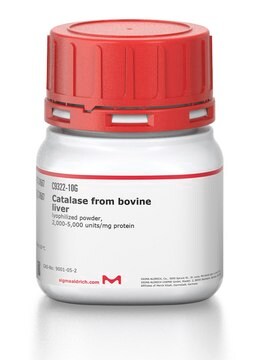CAT100
Catalase Assay Kit
sufficient for ≥100 tests enzymatic, determination of catalase activity in tissues and cells
Synonym(s):
Catalase Activity Detection Kit
About This Item
Recommended Products
Related Categories
General description
Application
Biochem/physiol Actions
Features and Benefits
- Useful for determining catalase activity - may be used in various tissues and cells
- Simple, optimized protocol - A simple colorimetric assay for analysis of peroxisome enrichment and catalase activity
Suitability
Principle
Unit Definition
Preparation Note
Kit Components Also Available Separately
Signal Word
Danger
Hazard Statements
Precautionary Statements
Hazard Classifications
Resp. Sens. 1
Storage Class Code
12 - Non Combustible Liquids
WGK
WGK 1
Flash Point(F)
Not applicable
Flash Point(C)
Not applicable
Personal Protective Equipment
Choose from one of the most recent versions:
Certificates of Analysis (COA)
Don't see the Right Version?
If you require a particular version, you can look up a specific certificate by the Lot or Batch number.
Already Own This Product?
Find documentation for the products that you have recently purchased in the Document Library.
Customers Also Viewed
Articles
Centrifugation separates organelles based on size, shape, and density, facilitating subcellular fractionation across various samples.
Cellular oxidative stress is countered by enzymatic scavengers and antioxidant modulators against reactive oxygen species damage.
Our team of scientists has experience in all areas of research including Life Science, Material Science, Chemical Synthesis, Chromatography, Analytical and many others.
Contact Technical Service






